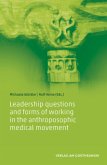Researchers, industry analysts and the broader medical fraternity generally agree that physician adoption of healthcare technology is vital to the advancement of healthcare outcomes and cost effectiveness. Accordingly, there is a vast body of research into technology design, implementation process methodology, total cost of ownership and many other technical factors. However, there is minimal research into the humanistic socio-medical components such as leadership, particularly transformational leadership. In general leadership is one of the most observed and least understood phenomena on earth (Burns, 1978). The entrenched rigid hierarchical structure of the medical fraternity sets forth legitimized power and authoritative leadership by decree to the members of this complex web. This research has a focus on the efficacy of transformational leadership mediated by trust in relation to the adoption of electronic medical record technology. The purpose of this research is twofold. First, it examines the perceptions of transformational leadership by senior management in healthcare. Secondly, it explores if and how the practice of transformational leadership, mediated by trust.
Bitte wählen Sie Ihr Anliegen aus.
Rechnungen
Retourenschein anfordern
Bestellstatus
Storno






![The Homoepathic Domestic Physician [electronic Resource] The Homoepathic Domestic Physician [electronic Resource]](https://bilder.buecher.de/produkte/71/71700/71700661m.jpg)

